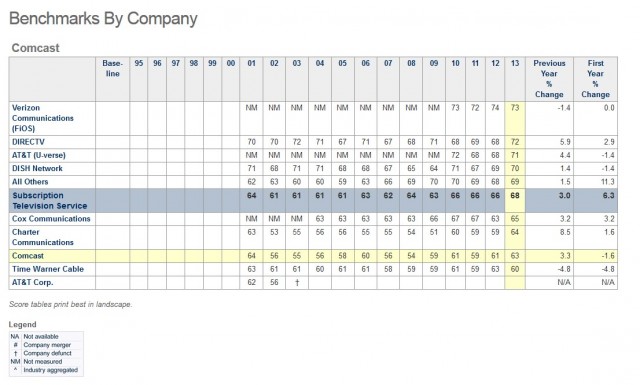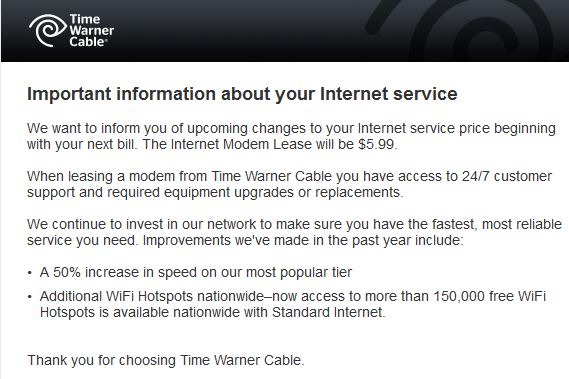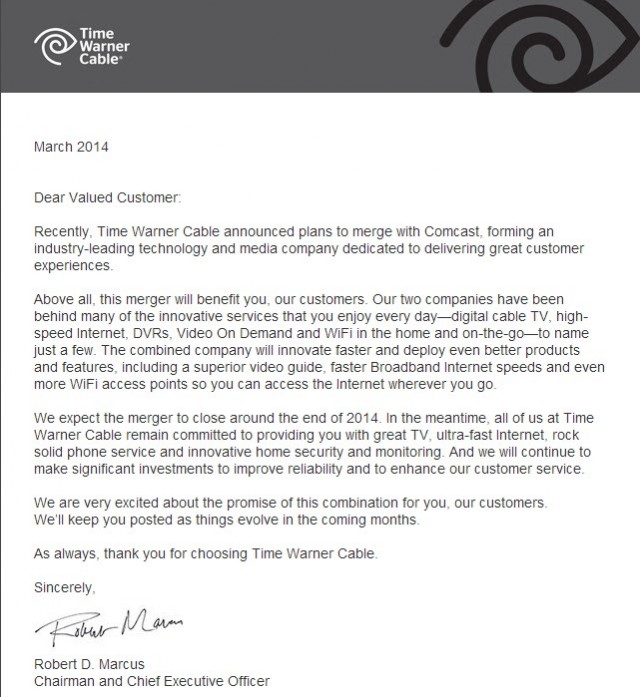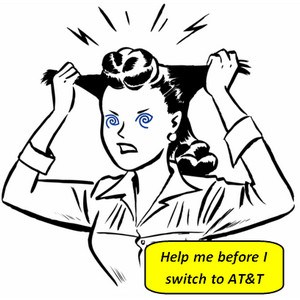 Normally when one learns they are losing a job after only a few months in management, it is a time for sober reflection and emotional recovery.
Normally when one learns they are losing a job after only a few months in management, it is a time for sober reflection and emotional recovery.
Not so for top executives at Time Warner Cable who can expect Golden Parachute packages that rival the Powerball jackpot.
CEO Robert Marcus, who will eventually walk away from Time Warner Cable after becoming its CEO only this year will receive a package worth up to $80 million, according to a document filed with the Securities and Exchange Commission. That is way up from the estimated $56 million severance package he was anticipating.
In addition to more cash and stock options, Time Warner Cable created something called a “supplemental bonus opportunity” that will hand Marcus an extra $2.5 million in walk-around money if he agrees to stick around until the merger is completed. The idea behind the bonus incentive is to keep executives happy during the pendency of the merger. If top employees defect or lose focus on Time Warner Cable’s operating plan over the coming year, it could rattle the value of the company’s stock.
Most regular employees are not invited to the enhanced compensation party and will spend the rest of this year updating their resumes before the combined company finds millions in “cost savings” from anticipated layoffs and call center closures.
Time Warner Cable’s Golden Parachute Compensation
| Name | Cash ($)(1)(2) |
Equity ($)(3) |
Perquisites/ Benefits ($)(4) |
Other ($)(5) |
Totals ($) |
|||||||||||||||
| Robert D. Marcus | ||||||||||||||||||||
| Chairman and Chief Executive Officer (former President and Chief Operating Officer) | 20,458,904 | 56,506,890 | 399,838 | 2,500,000 | 79,865,632 | |||||||||||||||
| Glenn A. Britt | ||||||||||||||||||||
| Retired Chairman and Chief Executive Officer(6) | — | — | — | — | — | |||||||||||||||
| Arthur T. Minson, Jr. | ||||||||||||||||||||
| Executive Vice President and Chief Financial Officer | 7,008,904 | 19,327,402 | 80,132 | 675,000 | 27,091,438 | |||||||||||||||
| Michael LaJoie | ||||||||||||||||||||
| Executive Vice President and Chief Technology and Network Operations Officer | 3,374,658 | 12,539,053 | 72,164 | 325,000 | 16,310,875 | |||||||||||||||
| Philip G. Meeks | ||||||||||||||||||||
| Executive Vice President and Chief Operating Officer, Business Services | 3,715,068 | 7,622,524 | 58,751 | 300,000 | 11,696,343 | |||||||||||||||
| Irene M. Esteves | ||||||||||||||||||||
| Former Executive Vice President and Chief Financial Officer | ||||||||||||||||||||
Among the benefits for the top-five executive officers:
- accrued but unpaid bonus for any previously completed fiscal year, based on actual results for the year;
- pro rata bonus for service during the year of termination, based on actual results for the year;
- 36 months of continued salary and bonus payments, paid on TWC’s normal payroll payment dates for salary, where the bonus component is set at target.
Wall Street Bank Money Party
 In the all-encompassing merger proposal submitted to the Securities and Exchange Commission, Time Warner Cable noted it sought the advice of several Wall Street investment banks and related institutions. Unsurprisingly, based on the material submitted voluntarily by Time Warner Cable and Comcast, the banks submitted written reports declaring that the merger proposal seemed fair. For that, these advisers were well-compensated. In all, Time Warner Cable and Comcast will pay a combined $135.5 million in fees in return for the positive assessment of the merger’s potential:
In the all-encompassing merger proposal submitted to the Securities and Exchange Commission, Time Warner Cable noted it sought the advice of several Wall Street investment banks and related institutions. Unsurprisingly, based on the material submitted voluntarily by Time Warner Cable and Comcast, the banks submitted written reports declaring that the merger proposal seemed fair. For that, these advisers were well-compensated. In all, Time Warner Cable and Comcast will pay a combined $135.5 million in fees in return for the positive assessment of the merger’s potential:
- In connection with Allen & Company’s financial advisory services, TWC has agreed to pay Allen & Company an aggregate cash fee of $25 million, a portion of which was payable upon delivery of Allen & Company’s opinion to the TWC board of directors in connection with the merger and $17.5 million of which is contingent upon consummation of the merger;
- In connection with Citi’s services as TWC’s financial advisor, TWC has agreed to pay Citi an aggregate fee of $36 million, of which a part was payable upon delivery of its opinion and $28.5 million is payable contingent upon consummation of the merger. In addition, TWC has agreed to reimburse Citi for certain expenses, including fees and expenses of counsel, and to indemnify Citi and related parties against certain liabilities, including under federal securities laws, arising from Citi’s engagement;
- TWC has agreed to pay Morgan Stanley for its financial advisory services in connection with the merger an aggregate fee of $36 million, of which a part was payable upon delivery of its opinion and $28.5 million is payable contingent upon the closing of the merger;
- In connection with Centerview Partner’s LLC services as the TWC independent directors’ financial advisor, TWC has agreed to pay Centerview an aggregate fee of $11 million, portions of which were payable upon the rendering of Centerview’s opinion and in connection with its engagement and $3 million of which is payable contingent upon consummation of the merger;
- J.P. Morgan has acted as financial advisor to Comcast with respect to the proposed merger and will receive a fee from Comcast for its services equal to a total of $27.5 million, $25 million of which will become payable only if the proposed merger is consummated.


 Subscribe
Subscribe


 “After twenty years of Time Warner’s broken promises, service you can’t count on, and price hikes you can, I made the fatal mistake of running away from one bad relationship into the arms of another with the Bernie Madoff of broadband: AT&T,” wrote another. “Slower service, an unnecessary allowance on broadband usage, and one rate increase too many is hardly the improvement we were promised in the shiny brochure. But we have nowhere else to go.”
“After twenty years of Time Warner’s broken promises, service you can’t count on, and price hikes you can, I made the fatal mistake of running away from one bad relationship into the arms of another with the Bernie Madoff of broadband: AT&T,” wrote another. “Slower service, an unnecessary allowance on broadband usage, and one rate increase too many is hardly the improvement we were promised in the shiny brochure. But we have nowhere else to go.”


 Comcast is dumping a blizzard of cash on Capitol Hill in a late winter storm of lobbying to win approval of its $45 billion buyout of Time Warner Cable.
Comcast is dumping a blizzard of cash on Capitol Hill in a late winter storm of lobbying to win approval of its $45 billion buyout of Time Warner Cable.

 Ron Klink and Associates provides clients with the opportunity to influence the decisions made in the halls of Congress, federal agencies and the White House. We have extensive experience in issues analysis that can be helpful to a client trying to anticipate policy changes in the government. Ron Klink and Associates will work with the client to develop and then successfully implement a strategy that yields desired results. Our extensive contacts on Capitol Hill and the Executive Branch, allow our clients’ issues, whether legislative or regulatory, to be heard by key decision makers, thus giving a competitive advantage to the client.
Ron Klink and Associates provides clients with the opportunity to influence the decisions made in the halls of Congress, federal agencies and the White House. We have extensive experience in issues analysis that can be helpful to a client trying to anticipate policy changes in the government. Ron Klink and Associates will work with the client to develop and then successfully implement a strategy that yields desired results. Our extensive contacts on Capitol Hill and the Executive Branch, allow our clients’ issues, whether legislative or regulatory, to be heard by key decision makers, thus giving a competitive advantage to the client. With thousands of lobbyists providing services similar to ex-Congressman Klink, it should not be surprising ordinary constituents without a team to go to bat on their behalf have a hard time getting a word in.
With thousands of lobbyists providing services similar to ex-Congressman Klink, it should not be surprising ordinary constituents without a team to go to bat on their behalf have a hard time getting a word in. The former congressman seems reluctant to admit he works for a communications conglomerate known for its constantly rising cable rates and less-than-stellar customer service.
The former congressman seems reluctant to admit he works for a communications conglomerate known for its constantly rising cable rates and less-than-stellar customer service.
